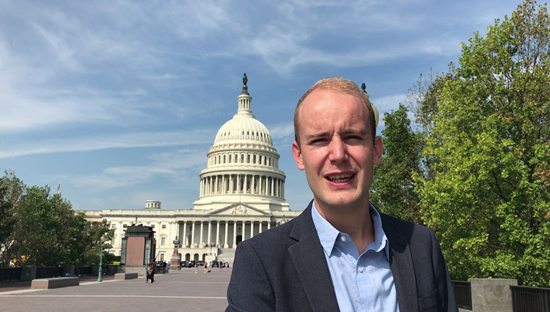'Voor een journalist is Amerika een speeltuin'
Emile Kossen (29) had niets speciaals met Amerika toen hij de bachelor American Studies koos. Hij was er ook nog nooit geweest. Hij ambieerde een master journalistiek en daar moest een bachelor aan voorafgaan.
Tekst: Ellis Ellenbroek / Bron: Broerstraat 5
Het kan verkeren: In 2017, twee jaar na zijn afstuderen, werd hij gevraagd voor het correspondentschap in Amerika voor Elseviers Weekblad. 'Ik werkte op de Elsevierredactie in Amsterdam, toen de plek hier vrijkwam,' vertelt Kossen vanuit Washington. 'Ik was 25, had niet het idee dat ik zo jong voor de baan in aanmerking zou komen, ondanks mijn studie. Ik heb geluk. Voor een journalist is Amerika een speeltuin. Er wonen meer dan 300 miljoen mensen, er zijn zoveel verhalen te vertellen. De ene dag sta ik in Washington te praten met een senator, een paar dagen later ben ik op pad met een cowboy. Ik heb een paar weken bij de Amish gezeten, in Ohio.'

Waar was je op 6 januari toen Trumpianen het Capitool bestormden?
een nieuw visum. Het is toch de bedoeling dat je er bent als correspondent, op dat soort momenten. Al heb ik als weekbladjournalist minder met de actualiteit van de dag te maken. De grap is dat de gevestigde journalisten ook niet zoveel hebben meegekregen van de bestorming. Die zaten in de perskamer van het Capitool en moesten de schuilkelder in.'
De meeste Nederlanders - journalisten voorop - zijn Trump-bashers. Hoe kijk jij aan tegen die stelling?
'Eens. Nederlanders zijn, als het over Amerika gaat, altijd al meer op de hand van de democraten, dan de republikeinen. Vóór Trump was dat ook al zo. Trump maakte het erger. Omdat het zo'n markant figuur is. Voor het journaille zou het niet moeten uitmaken. Als journalist hoor je in het midden te staan, als neutrale observeerder. Je moet over je eigen drempels heen stappen. Dat betekent weer niet dat je geen kritiek op Trump kunt hebben.
Nederlanders nemen de frames over van The Washington Post of The New York Times, allebei anti-Trump. Daar gaat het al mis. Er zijn 74 miljoen Trump-stemmers, dan is het geen onbelangrijke taak die mensen ook te spreken. En dan moet je niet in het stuk lezen dat de journalist niks heeft met hun mening.
Het gevaar is nu ook dat er op Biden helemaal geen kritiek mag komen. Dat hij wordt aangepakt met kidgloves, niet aangepakt dus.'
Elsevier bundelde je stukken over Trump. In een boek van je vorig jaar overleden collega Rik Kuethe schreef jij de hoofdstukken over Trump en Biden. Een derde boek is in de maak. Waar gaat dat over?
'Als ik ben gevaccineerd, ga ik per trein op zoek naar hoopvolle verhalen over verbinding. Het lijkt soms dat in Amerika iedereen boos is op elkaar en in een vijandmodus zit vanwege zogenaamd gestolen verkiezingen. Dat valt wel mee.'
Hoe Amerikaans ben je zelf al?
'Ik ben ergens juist meer een Nederlander geworden. Ik ben bijvoorbeeld een groot fan nu van de NS. Als je ziet hoe gebrekkig het Amerikaanse openbaar vervoer is geregeld! Autorijden is weer een stuk relaxter hier. Niet die krappe wegen en de kleine parkeerplekjes van Nederland. Urenlang op de cruisecontrol over de achtbaans interstates.'
